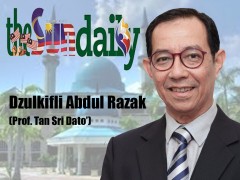Berita

Posted on 18 July 2018 - 08:05am
Last updated on 18 July 2018 - 08:10am
Dzulkifli Abdul Razak
THE Education Ministry will carry out a holistic study before making a decision on whether to recognise the Unified Examination Certificate, said its minister Maszlee Malik recently. This column lauded the statement by underscoring that the operational word is "holistic" which is to be understood within the Malaysian context. Otherwise it can mean many things to many people including those who are not "holistic" in their understanding of what education is all about and have the tendency to hijack the discussion politically to serve their self-interest. One former politician is already attempting to do this. The minister is against such a move and deserves to be supported.
To be sure, all types of qualification or certification are outcomes of one or many education systems. The "holistic-ness" in terms of policy decisions must be made within such a context if it is to be "educationally" meaningful. That is to say it is not about any one part of the system, especially the certification as an endpoint per se, but what goes into it. This takes us back to the heart of the issue, the Falsafah Pendidikan Negara (FPN, 1988) since three decades ago that spells out clearly in its very first sentence what "holistic" means – suatu usaha berterusan ke arah memperkembangkan lagi potensi individu secara menyeluruh dan bersepadu ...".
Key words that framed any policy decisions must take cognizance of the three elements of being continuous (lifelong), complete (life-wide) and convergence (life-worthy) respectively, reflective of the outcome that shapes a successful Malaysian education. And this is to be embodied "holistically" too in the individual/learner as a person who is balanced and in harmony (insan yang seimbang dan harmonis) in four main dimensions: intellectually, spiritually, emotionally and physically. I am convinced that we cannot be more "holistic" than this especially when it is mirrored by Unesco's four pillars of learning unveiled almost 10 years later in 1996.
The truth of the matter is that the education system itself ought to be "seimbang dan harmonis" before we can hope to see Malaysians embracing the same regardless of certification that is granted by whatever name or institution. After all what is in a name (sometimes exorbitantly branded) if it shies away from our national aspiration in violation of the FPN, later FPK (Falsafah Pendidikan Kebangsaan, 1996). And by extension globally against the Unesco pillars of learning as well as the sustainable development goals.
To be blunt, any policy decision made with no regard to this is necessarily "flawed" and must be challenged. This has been the crux of the issue where no politician dares to venture for fear of political suicide. Never mind if it is a social time bomb. So unless such a "legacy" is dismantled head on (60 years have passed as the minister said) then there is every chance that we will prolong a "failed" system to hopelessly power the "new" Malaysia. Not just in letter but more so in spirit, namely, nurturing "new" Malaysian mindsets that are balanced and in harmony. We can do away with the need for other confusing notions like "moderates" or "wassatiyyah" or groupings who promote their own leanings when the education system is well rooted in values that are functionally "balanced and harmonious".
That the issue keeps recurring is enough to show that the FPK has been sidelined for far too long if not ignored. What else to embrace it as a philosophy to live by and proudly shaping the aspiration of Malaysia as prominently engraved in the national emblem – "Bersekutu bertambah mutu" – (remember?) at once rendering the 1Malaysia slogan redundant and politically divisive (ironically) from its inception.
In other words, nothing can be construed as "holistic" without first debunking the "old" strategy of divide and rule that is in-built in the education system(s), policy and structures. As previously noted (MyView, June 27) we cannot just reject race-based politics to be fashionable without first rejecting race-based education systems. Figuratively, the latter is the viper pit that feeds into the former.
To top this, the fact that the system is archaic has been well argued. Again it is impossible to be "holistic" as defined by FPN/FPK/Unesco when each component of the overarching system is not "holistically" linked educationally speaking, reinforced by the race-based multi-streamed system. Therein is the characteristic siloed, first industrial revolution model ingrained with assembly-like exploitative norms, which are not conducive for the 21st century collaborative learning environment to blossom.
In a nutshell, the UEC issue is just the tip of the iceberg when it comes to resetting the education system in a "holistic" way as advocated by the education minister.
It is time to take this discourse forward with a "new" frame of mind based on our philosophy to nurture generations of "new" Malaysians. Otherwise we will slide back to the "old" ways sooner than we thought.
Read more: http://www.thesundaily.my/news...








